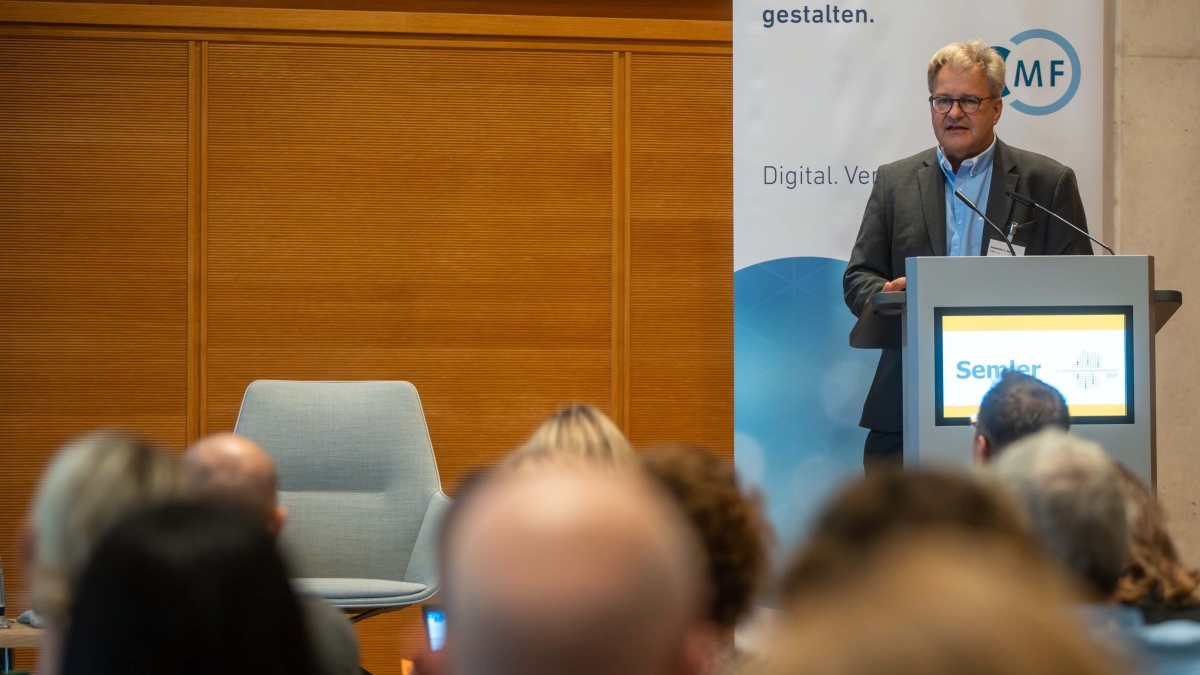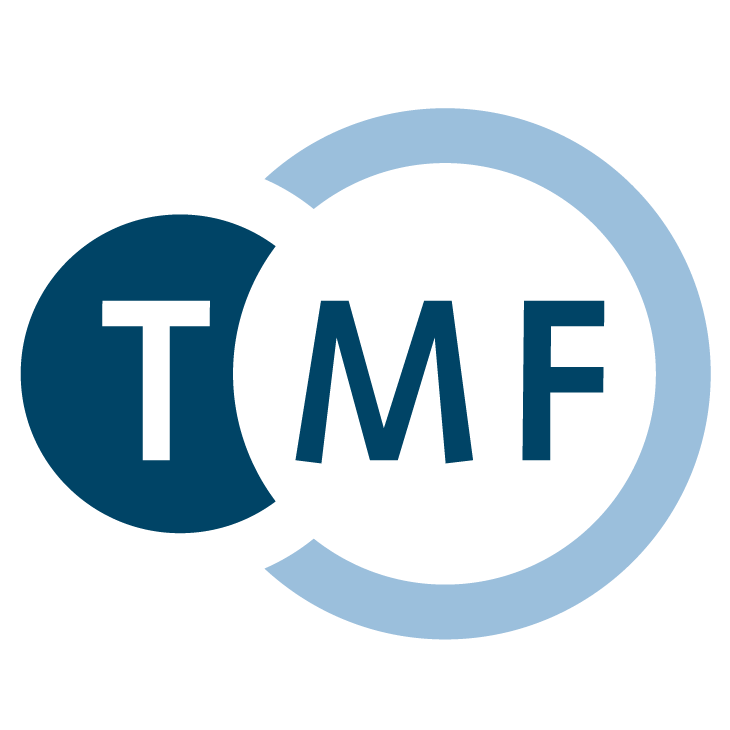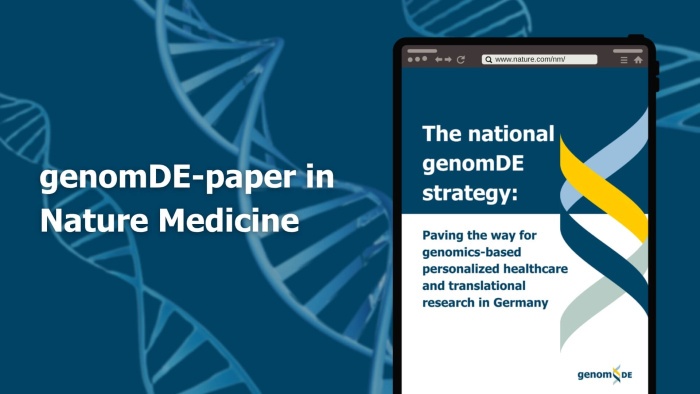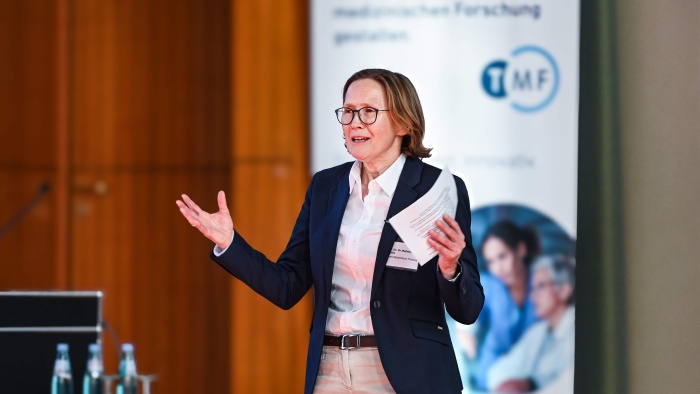12th National Biobanking Symposium: Networked Biobanks Drive Medical Research Forward

The TMF’s Managing Director, Sebastian C. Semler. © TMF
The increasing centralization and networking of biobanks, especially within the German Centers for Health Research (DZG) and the German Biobank Alliance, has significantly advanced medical research in recent years. "Networked biobanks have become indispensable pillars enabling the development of new therapies and medications," emphasized conference president PD Dr. Karoline Gaede at the opening of the conference. Around 200 experts gathered in Berlin from September 23-24, 2024, at the 12th Biobank Symposium to discuss the latest developments in biobanking.
Prof. Dr. Martin Witzenrath from Charité – Universitätsmedizin Berlin and Dr. Yvan Devaux from the Luxembourg Institute of Health (LIH) demonstrated, using COVID-19 as an example, that biobanks played a crucial role in the early understanding of the pathophysiology of COVID-19. Through biological samples, fundamental insights were gained into the virus's behavior, immune response, and disease severity, which contributed to the development of diagnostics, therapeutics, and vaccines.
Large centralized sample collections are increasingly being created at the German Centers for Health Research to assist researchers in conducting high-quality research. Dr. Amélie Schellenbauer from the German Center for Diabetes Research (DZD) presented the success story of identifying different prediabetes subtypes. In people with prediabetes, six distinct subtypes have been identified, which differ in disease development, diabetes risk, and the development of complications. DZD researchers are currently characterizing these subtypes through proteomics analysis of over 2,500 biological samples available in the DZD biobank. This research aims to identify and treat individuals with a high-risk profile earlier.
Challenges in Biobank Emergency Management
A major focus of the conference was the emergency management of biobanks. Dr. Juliane Weikert from the Leipzig Medical Biobank (LMB) recommended that biobanks develop emergency plans and conduct a risk analysis, considering all processes and resources. Specific emergency scenarios should be described, including backup strategies for equipment failures or analog documentation in the event of software failures. The German Biobank Alliance has developed templates for biobanks that can be used in such emergency situations.
Dr. Kristina Götze from the Interdisciplinary Biomaterials and Data Bank Frankfurt (iBDF) demonstrated how crucial an emergency plan for a biobank is, based on the IT failure caused by a hacker attack at the University Hospital Frankfurt. In October 2023, the entire hospital's IT system had to be disconnected from the internet, which had significant impacts on the biobank, such as preventing access to sample information and external partners. A key issue was how to keep core systems operational without external internet connections. The lessons learned from this incident are now being used to enhance the biobank’s resilience.
Dr. Sanela Kjellqvist from the Karolinska Institutet Biobank (KI Biobank) showed how important clear role definitions and responsibilities are during emergencies, citing an incident at the Swedish KI Biobank in 2023. During a freezer failure, large quantities of biological samples were lost due to a temperature rise caused by a technical malfunction.
Current Legislation and Biobanks
Sebastian C. Semler, managing director of the TMF, presented current laws and initiatives and their impact on biobanks. The Health Data Use Act (GDNG) includes, among other things, a nationwide regulation for consent-free self-research by data-processing healthcare institutions with data from patient care. However, the use of biological samples is not regulated by this law, Semler explained. The upcoming European Health Data Space (EHDS) does not foresee simplifications for the collection and use of samples either. He recommends that "biobanks should continue to seek consent for sample use with broad consent." There are still many questions about the implementation of the GDNG, and TMF, together with the Network of University Medicine (NUM), operates a task force within the Medical Informatics Initiative (MII) to address all questions related to its implementation. Among other things, the task force will coordinate project submissions to data protection authorities and aims to harmonize standards with data protection authorities and ethics committees. Coordinated dialogue with patient organizations is also essential.
Press Contact
Wiebke Lesch (TMF)
Phone: +49 30 2200 24731
Mobile: +49 177 2663257
Email: presse@tmf-ev.de
X: @tmf_eV
Further Information

Über die TMF e.V.
Die TMF - Technologie- und Methodenplattform für vernetzte medizinische Forschung e. V. ist die Dachorganisation für die medizinische Verbundforschung in Deutschland. Die TMF bringt Forschende unterschiedlicher Disziplinen zusammen, um gemeinsam Konzepte, Infrastrukturen und Methoden für die Forschung zu entwickeln. In der AG Biobanken werden Themen wie rechtliche, ethische und technische Rahmenbedingungen für Biobanken diskutiert. Insbesondere große Konsortialvorhaben und Leuchtturmprojekte wie aktuell die Medizininformatik-Initiative werden durch die TMF inhaltlich und organisatorisch durch eine Trägerschaft von Begleitstrukturen unterstützt. Mit der Bündelung von Ressourcen leistet die TMF einen wichtigen Beitrag zu einer effizienten medizinischen Spitzenforschung in Deutschland.


